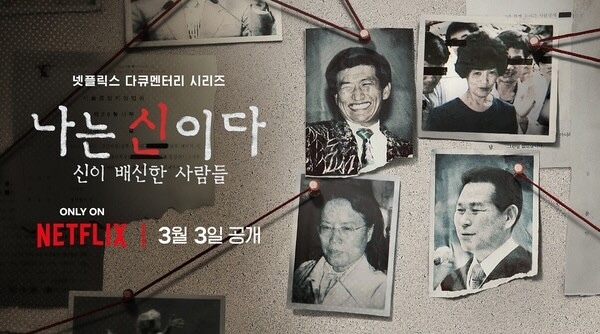
Through In the Name of God: A Holy Betrayal, which was recently released on Netflix, people are interested in events that occurred in pseudo-religion in the modern history of the Republic of Korea. The documentary details the incident that occurred in South Korea. In addition, through interviews with pseudo-religious victims introduced in the documentary, he revealed that he could be exposed to financial losses and sexual crimes at that time and ruin his life. Such pseudo-religion is now common around us. We need to look at the past actions of pseudo-religion and find out how we should distinguish pseudo-religion now.
The pseudo-religion we talk about first is the Christian Gospel Mission(CGM). Also known as JMS, it is an abbreviation named after Jeong Myung-seok, the founder of the church. As of 2015, there are about 200 to 300 JMS nationwide, and it is a large church. Since its foundation, JMS has focused on missionary activities for university students and has mainly carried out small-scale activities rather than religious events. He mainly approached university students and talked about stories unrelated to religion, but he gradually mentioned stories about the Bible and brainwashed them to believe that he was Messiah. It is estimated that there are about 40,000 followers of JMS. They have also been teaching women when approaching university students. This was to run the Joy Group, some of which were used as individual slaves. The victims have informed other believers, but they have taken measures such as removing the victims from the church. After being informed of such behavior, JMS fled overseas, but was sexually assaulted by Taiwanese female college students and Japanese followers and was arranged. However, he helped JMS escape because there were prosecutors and NIS agents among JMS followers, which was arrested in 2007 and is now in custody. Such evil deeds of JMS became known again through documentaries.
The second is the O-DAE YANG. O-DAE YANG was named by the leader Park Sun-ja, and she gathered people to build a company and started a business. This included kindergarten, nursing home and orphanage projects. They expanded these economic businesses and acquired factories. The biggest incident in the O-DAE YANG was the 1987 mass suicide of 32 people, including founder Park Sun-ja. The incident, which was caused by a pseudo-religion, shocked the entire nation at that time. The ceiling was made of gypsum boards, where 32 people spent four days hiding. Two or three bodies were piled up in a mere four flats area, and they were strangled to death. It was presumed that they strangled each other to death. The case was a mystery at the time and a second investigation began in 1991. The suicide of the Five Oceans was revealed to be a pseudo-religious frenzy and the incident ended. A total of three re-investigations have been carried out to reveal most of the facts, but this case can be concluded as a collective action of pseudo-religion.
In addition to the two pseudo-religion mentioned earlier, there are also various pseudo-groups and incidents such as Agadongsan and the Manmin Central Church. Such pseudo-religion exists very close to our lives. They do missionary work to people near schools and places where many people gather, such as Dongseong-ro. Efforts should be made to prevent crimes such as family destruction, rape and fraud, which are the biggest problems of pseudo-religion.








